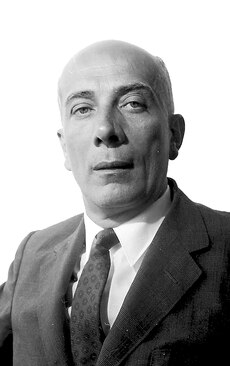Rio Claro, 1916 – Ponta da Joatinga (Brasil), 1992
By Gilberto Maringoni
A lawyer graduated from the University of São Paulo (USP) in 1940, Ulysses Silveira Guimarães had one of the longest and most distinguished political careers in 20th-century Brazil. He was vice-president of the National Student Union (UNE) in 1940; state constituent deputy for the PSD (1947-1950); federal deputy (1950-1992); Minister of Industry and Commerce (1961-1962); president of the Chamber of Deputies three times (1956-1957, 1985-1986, and 1987-1988); and president of the main opposition party to the military dictatorship, the Brazilian Democratic Movement (MDB), from 1972 to 1980, and of its successor, the Brazilian Democratic Movement Party (PMDB), from 1980 until his tragic death in an air accident.
A parliamentarian at the time of the 1964 coup, he initially expressed sympathy for the military movement but soon opposed it, denouncing the coup’s illegitimacy. His confrontational stance radicalized toward the end of General Emílio Garrastazu Médici’s government (1969-1974), when he ran as an anti-candidate against Médici’s indirect election by the Electoral College, then composed of the National Congress. Ulysses traveled the country with his vice, journalist Barbosa Lima Sobrinho (1897-2000), campaigning against the prevailing authoritarianism. A phrase he uttered in a speech in Salvador (BA) after a police siege of his convoy — “Bayonets are not votes, and dogs are not ballot boxes” — became a campaign slogan.
Ulysses Guimarães was already the main opposition leader when he emerged as the leader of the most important mass movement in Brazil’s history: the campaign for direct elections in 1984. Millions of people took to the streets in hundreds of Brazilian cities to demand their right to vote for president at a time when the dictatorship’s economic project, following the 1982 external debt crisis, was collapsing. The popular outcry was defeated in Parliament but strengthened the candidacy of Tancredo Neves, also from the PMDB, in the Electoral College. A split in the dictatorship’s party, the National Renewal Alliance (ARENA), enabled the election of the opposition candidate. Tancredo died before taking office. Ulysses was decisive in ensuring that Vice President José Sarney assumed the presidency and governed from 1985 to 1990.
From 1987, Ulysses led the work of the Constituent Congress as its president, resulting in the 1988 Constitution. He served briefly as acting President of the Republic on a few occasions. However, his undeniable achievements were not enough to fulfill his greatest dream—being elected president. In 1989, in the first direct election since 1960, he finished seventh with about 5% of the votes. The crisis that hit Sarney’s government in its final phase deeply affected the PMDB, caught in a polarized contest between a left-wing candidate (Luiz Inácio Lula da Silva) and a right-wing candidate (Fernando Collor de Mello).
Reelected federal deputy for the eleventh time in 1990, Ulysses Guimarães actively participated in the campaign for the impeachment of President Collor de Mello, approved by Congress in September 1992. On the 12th of that same month, returning by helicopter from a short rest in Angra dos Reis (RJ), he suffered an accident and disappeared at sea, accompanied by his wife Mora and Senator Severo Gomes and his wife.





